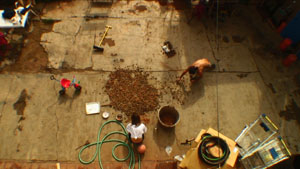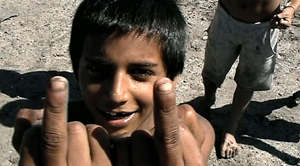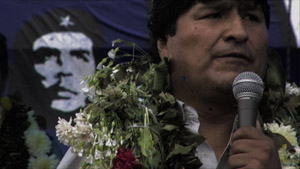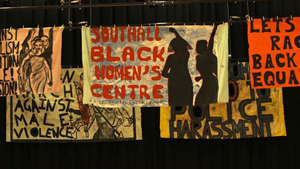
Pic.: John Jordan/Isabelle Fremeaux,
Filmstiil: Paths trough Utopias, 2011.
|
|

|
Pic.: John Jordan/Isabelle Fremeaux,
|
|
|
|
As the global financial crisis surfaced in
2007, we journeyed for 7 months across Europe to investigate and experience
examples of post-capitalist living - from a direct action Climate Camp
set up illegally on the edges of Heathrow airport to a hamlet squatted
by French punks, an off grid low impact permaculture community to occupied
self-managed Serbian factories, a free love commune in an ex Stasi base
to a farm where private property had been abolished, we shared different
ways of loving and eating, producing and sharing things, deciding together
and rebelling. We were not looking for escapist Neverlands, blueprints
for a perfect future or universal systems, but communities who simply
dare to live differently, despite the catastrophe of capitalism. From
this experience came our film-book, fusing reflective travel writings
with an attached DVD. Whilst the book is a rich travelogue, analyzing
the communities, their practices and their histories, the film is a magic-realist
road movie set in an imagined post-crash future but shot in the style
of a fictional documentary during the journey.
|

|
Pic.: Fernando Solanas, Memory of a Plunder, Filmstill, 2003.
|
|
|
|
After the fall of the military dictatorship
in 1983, successive democratic governments launched a series of reforms
purporting to turn Argentina into the world's most liberal and prosperous
economy. Less than twenty years later, the Argentinians have lost literally
everything: major national companies have been sold well below value to
foreign corporations; the proceeds of privatizations have been diverted
into the pockets of corrupt officials; revised labour laws have taken
away all rights from employees; in a country that is traditionally an
important exporter of foodstuffs, malnutrition is widespread; millions
of people are unemployed and sinking into poverty; and their savings have
disappeared in a final banking collapse. The film highlights numerous
political, financial, social and judicial aspects that mark out Argentina's
road to ruin.
|

|
Pic.: Alejandro Landes, Cocalero, Filmstill by Jorge Manrique Behrens, 2007
|
|
|
|
Born out of the US War on Drugs, an Aymara
indian named Evo Morales - backed by a troop of coca leaf farmers - travels
through Andes and Amazon in jeans and sneakers, leading a historic bid
to become Bolivia's first indigenous president. |

|
Pic.: Petra Bauer, Sisters!, Filmstill, 2011.
|
|
|
|
Sisters! is a collaboration
between Petra Bauer and the Southall Black Sisters—the radical,
pioneering London-based feminist organisation that since 1979 have politically
engaged in the contemporary social and political conditions of black and
minority women. Sisters! is not a film about the Southall Black Sisters,
but is a two-way project between Bauer and the staff at the organisation.
Documenting one week in the life of the organisation, the film takes their
daily activities as a springboard for a visual discussion on feminism,
politics and aesthetics in today's society. The film departs from questions
posed in the 1970s Women's Liberation Movement (particularly those explored
by feminist film collectives from the time); and consequently focus on
important feminist issues for today's black and minority women, according
to Southall Black Sisters. |